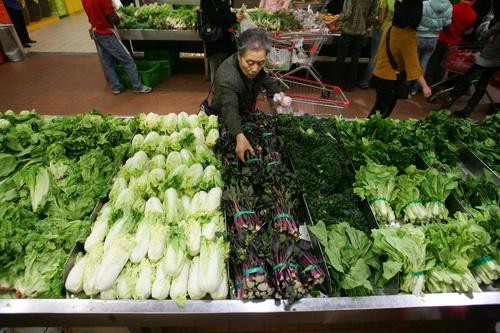Key index hits 19-month high, but analysts say more tightening policies unlikely
BEIJING - China's main consumer inflation index rose 3.1 percent year-on-year in May from 2.8 percent in April, hitting a 19-month high, but analysts said this does not mean that further tightening policies, such as an interest rate hike, are in the pipeline.

A customer selects vegetables at a supermarket in Chongqing. Fresh vegetable prices, a well-recognized major contributor to CPI growth in recent months, fell 9.8 percent month-on-month in May. [OUYANG ZUBING / FOR CHINA DAILY]
According to the National Bureau of Statistics, which released a number of economic indicators on Friday, the 3.1 percent rise in the consumer price index (CPI), a major measure of inflation, for May exceeded the government-set limit of 3 percent for the year.
But it has weakened on a month-on-month basis and therefore does not point to rising inflationary pressure, especially considering that economic growth has shown some signs of slowing down, analysts said.
The index dropped 0.1 percent month-on-month in May, according to the statistics bureau. Sheng Laiyun, a spokesman for the bureau, said that as a result, inflationary pressures have actually been alleviated.
Sheng attributed the year-on-year inflationary index rise to the low base in May 2009, as well as surging food and housing prices in recent months.
Food prices rose 6.1 percent year-on-year in May, according to the bureau.
Housing prices increased 5 percent in May compared with the same period last year, and posted a monthly gain of 0.2 percent.
Month-on-month, however, food prices declined 0.5 percent while fresh vegetable prices, a well-recognized major contributor to CPI growth in recent months, fell 9.8 percent, alleviating concerns about continuous price rises.
"What's more, decreasing commodity prices as a result of the sovereign debt crisis in Europe will help ease inflationary pressures," Sheng said, who predicted the figure may reach its highest point in June or July due to the low base in 2009, before easing in the third quarter.
He said the government will still hopefully keep inflation within 3 percent for the whole year as it had previously vowed.
But the exceptional 7.1 percent year-on-year rise in May of the producer price index (PPI), a measure of factory-gate prices, has sparked concerns that it could trigger further CPI growth.
Lu Zhengwei, chief economist at Industrial Bank, said that even if CPI continued to rise in the next few months, there is little possibility of the government raising interest rates.
"The authorities would target the whole economic situation instead of merely CPI when investment and industrial output growth continues to slow down," he said.
In May, China's industrial output rose 16.5 percent year on year, 1.3 percentage points lower than April's figure. From January to May, it went down 0.6 percentage point compared with the January-April period while urban investment in fixed assets dropped 0.2 percentage point.
Lu said the previously implemented tightening measures, such as controls on lending, would have an effect within a year, and the government would not raise interest rates in the coming months.
However, Guo Tianyong, an economist at the Central University of Finance and Economics, called on the government to take this step given the negative real interest rates. China's benchmark one-year deposit rate currently stands at 2.25 percent.




